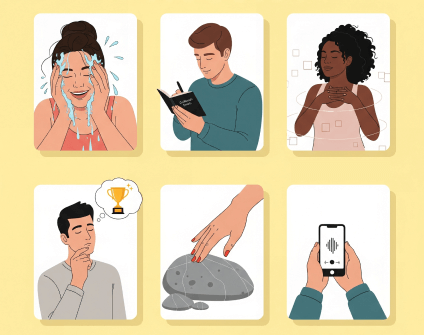Not everyone feels excited about gym memberships or intense workout routines, and that’s completely okay. Movement doesn’t need to look like a traditional workout. You can stay active without counting reps, wearing special gear, or joining a class.
Even simple activities can lift your energy, clear your thoughts, and support your focus in ways that might surprise you. When your body gets active, your mind becomes sharper, more alert, and less foggy. Here are 10 ways to bring meaningful movement into your weekend—filled with joy, intention, and no pressure at all.
1. Host a “Walk & Talk” Hangout
Instead of meeting a friend for coffee indoors, grab it to-go and head outside. Whether it’s a stroll through your neighborhood, a park, or even city streets, walking side-by-side takes the pressure off the conversation and makes connection feel more natural.
Steve Jobs often held walking meetings, and for good reason. Walking has a unique ability to clear your mind and inspire fresh ideas. As philosopher Friedrich Nietzsche put it, “All truly great thoughts are conceived while walking.” It’s a simple practice that can unlock clarity and spark creativity.
Want to make it a regular thing? Choose a favorite route and a consistent time, like Saturday mornings. It can become something you look forward to, both for the movement and the meaningful conversation.

2. Dance While You Tidy
Cleaning might not be thrilling on its own, but when you add your favorite upbeat playlist, it suddenly becomes a dopamine rush. Wiping surfaces and folding laundry turns into a rhythm. Light, fun, and far more satisfying than expected.
There’s something about the combination of music and a cleaner space that works like a mental refresh. It lifts your mood, gets your body moving, and leaves both your environment and your mind feeling lighter.
Some weekends, I put on a playlist I haven’t heard in a while and let the music guide me from one corner of the room to the next. What starts as a quick tidy-up often turns into an hour of dancing between tasks, reorganizing shelves, and rediscovering old books or photos. By the end, the space looks better and I feel recharged, like I’ve cleared space in my mind too.

3. Go on a Bike Ride to a New Spot
You don’t need speed or spandex. Just hop on your bike and cruise to a place you haven’t been before, such as a cozy café, a quiet street, or a lookout with a view. Navigating somewhere new lights up your brain in ways a screen never could.
Exploring unfamiliar places strengthens neural pathways and ignites curiosity, which can lead to better focus and fresh thinking in the days that follow.
Try keeping a casual list of spots you want to visit. These could be recommendations from friends, places you pass by, or locations you come across online. When the weekend rolls around, choose one and turn it into your next little adventure.

4. Wander a Market
Farmers markets and vintage fairs are full of motion. You are walking, browsing, interacting, and engaging all your senses. It is social, tactile, and refreshing.
For me, walking through a lively place and taking in the colors, smells, and sounds feels like a meditation I did not know I needed. These small microadventures help lower cortisol, the stress hormone, which directly improves memory and attention.

5. Rearrange a Room
There is something quietly powerful about moving things around at home. Whether it is shifting a lamp, swapping two chairs, or giving your desk a new spot near the window, you are not just lifting objects. You are shifting your mindset.
As Martha Stewart once said, “Your home should be a reflection of how you want to live right now, and for the next phase of your life.” Even small changes in your physical space can reset your energy and perspective.
Physical activity combined with creative decision-making lights up multiple parts of your brain. It keeps you present and focused, and it gives you a clean slate both mentally and physically.

6. Explore Your City by Foot
Be a tourist in your own town. Find murals, new neighborhoods, quirky stores, or scenic alleys you’ve never noticed.
Once, I challenged myself to find every public staircase in my city. I ended up walking miles, discovering a secret courtyard, and feeling more connected to where I live. This kind of gentle activity improves memory and spatial awareness—both valuable for problem-solving and creativity.

7. Play Like You Did as a Kid
Throw a frisbee. Join a spontaneous soccer match. Jump on a trampoline. Even chasing bubbles with your kids. There’s something magical about motion that has no agenda except joy. As George Bernard Shaw famously said, “We don’t stop playing because we grow old; we grow old because we stop playing.”
Play lowers stress hormones and resets your brain, helping you return to work tasks later with more focus, patience, and creative energy. Make space for silliness this weekend. No rules, no goals—just motion for the fun of it. You’ll feel the difference.

8. Turn Errands into Challenges
Turn your everyday errands into mini missions. Walk to the store instead of driving. Skip the cart and carry a basket. Take the stairs, even if there’s an escalator right next to you.
These unplanned bursts of movement, known as incidental activity, keep your circulation flowing and your brain more alert, helping you stay mentally sharp without even trying. Try creating your own weekend challenge. See how many small actions you can sneak in. It adds up, and you’ll feel the difference in your focus.

9. Cook Creatively and Actively
Cooking is not just about food. It is a full-body experience. You are chopping, stirring, lifting, reaching, and moving around the kitchen. Try making something from scratch like dumplings, bread, or pasta. It is immersive, rewarding, and surprisingly energizing.
Cooking activates several areas of the brain at once, including touch, taste, smell, memory, and timing. It is like a workout for your senses, which helps ease anxiety and sharpen attention.
Pick one new recipe to try each weekend, or challenge yourself to cook a meal entirely from what is already in your fridge. The process keeps you engaged, and you get to enjoy the result.

10. Stretch While Watching TV
If you’re binging a show, grab a yoga mat and unwind your body while you watch. Roll out your shoulders, do gentle hip openers, or just lie on the floor and breathe deeply.
I keep a mat by the couch so it’s always an option—not a chore. It turns downtime into recharge time. Even light stretching boosts circulation and releases tension, which clears your head and improves attention span.

How Planndu Keeps You Moving
Planndu helps you build easy, enjoyable weekend routines that keep you active without feeling like exercise. Here’s how it works:
- Gentle Reminders: Set soft nudges for activities like morning stretch or afternoon walk, with weekend-only alerts to avoid distractions during the week.
- Build Habits: Turn fun motions into rituals, like Saturday dance clean or Sunday bike ride, with repeat reminders to keep them on track.
- Pomodoro Timer: Use the Pomodoro timer to take active breaks during your weekend projects—stretch, dance, or move after each work interval.
- Prioritize by Energy: Plan your weekend tasks based on how much energy you have, helping you stay active without overdoing it.
- Color-Coded Motion: Organize your activities by mood or movement type, like outdoors or creative, to ensure variety and balance.
- Save Inspiration: Jot down notes, create checklists, or pin locations and fun ideas so you’re always prepared with something energizing to try.

You don’t need to “work out” to feel better. Every step, stretch, or shuffle sends signals to your brain: I’m here. I’m alive. I care about my energy.
When your weekend includes regular activity, even just for fun, you’ll find yourself more focused, creative, and ready to tackle whatever comes your way on Monday. Albert Einstein said, “Life is like riding a bicycle. To keep your balance, you must keep moving.” Not quickly. Not forcefully. Just steadily.




